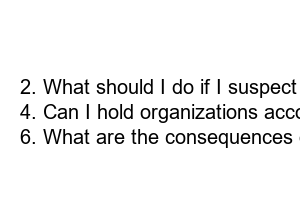개인 정보 유출 확인
Title: Is Your Personal Information at Risk? Confirming the Leakage
Introduction:
In the age of digital advancement and widespread internet usage, the safety of our personal information has become a growing concern. From online shopping to social media, our personal data is constantly being collected, stored, and shared. But do we really know how secure our information is? In this blog post, we will delve into the issue of personal information leakage, provide insights on identifying it, and offer tips to protect our data.
1. Personal Information Leakage: What is it?
* Personal information leakage refers to the unauthorized access, use, or distribution of sensitive data. It can occur due to various factors including cyberattacks, data breaches, or even careless handling of personal information by organizations.
2. Recognizing the Signs of Personal Information Leakage:
* Unexplained financial transactions, receiving unsolicited emails or phone calls, and noticing unfamiliar accounts or charges can indicate a possible compromise of personal information.
* Monitoring online presence, such as analyzing social media privacy settings, can help identify any potential risks.
3. Common Causes of Personal Information Leakage:
* Inadequate cybersecurity measures: Weak passwords, unsecured Wi-Fi networks, or outdated security software can make personal information vulnerable.
* Phishing and social engineering: Malicious actors use deceptive techniques to trick individuals into sharing their personal information willingly.
4. Safeguarding Personal Information:
* Regularly update passwords and enable two-factor authentication whenever possible. Strong passwords should include a combination of letters, numbers, and symbols.
* Be cautious when sharing personal information online, especially on social media platforms. Limit the visibility of your posts to trusted connections only.
* Regularly review and monitor financial statements, credit reports, and online accounts for any suspicious activities.
5. Seeking Legal Protection:
* Familiarize yourself with relevant privacy laws and regulations to understand your rights as a consumer.
* In case of personal information leakage, report the incident to the appropriate authorities and make sure to change compromised passwords and contact service providers.
6. Educating Others and Spreading Awareness:
* Share information about personal information leakage and its consequences with family, friends, and colleagues.
* Advocate for stronger privacy measures and support organizations that prioritize data protection.
Summary:
With the increasing threat of personal information leakage, it is crucial to stay vigilant and take proactive steps to safeguard our data. By recognizing the signs of leakage, understanding the causes, and implementing best practices to protect our information, we can minimize the risks. Stay informed, spread awareness, and together we can create a safer digital environment.
Frequently Asked Questions:
1. How can I check if my personal information has been leaked?
2. What should I do if I suspect my personal information has been compromised?
3. Are there any online tools available to help me secure my personal information?
4. Can I hold organizations accountable for personal information leakage?
5. How important is it to regularly update my passwords?
6. What are the consequences of personal information leakage?

